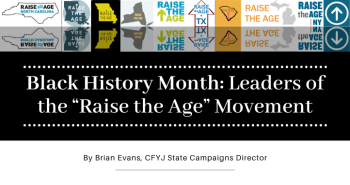Black History Month: Leaders of the “Raise the Age” Movement

In recognition of Black History Month, CFYJ is featuring a month-long series that celebrates advocates, elected officials and spokespeople that are leading the charge to reform how youth are treated in the criminal justice system.
By Brian Evans, CFYJ State Campaigns Director
The most successful youth justice movement over the past decade, that has dramatically reduced the numbers of children charged as adults, has been the movement to “Raise the Age”. Prior to 2007, there were 14 states with laws that required all 17-year-olds (and in some cases 16-year-olds) to be charged as adults, regardless of their alleged offense. Now there are just three (Georgia, Texas, and Wisconsin).
Racism and racial disparities have always been intimately intertwined with the adultification of children in our justice system, so it is no surprise that African-American advocates and legislators led the way in many of the states that raised the age over the last 10-15 years. For example, the most recent “Raise the Age” victory, in Michigan just last year, was led by Jason Smith, Director of Youth Justice Policy at the Michigan Center for Youth Justice (known then as the Michigan Council on Crime and Delinquency).
You can hear him talk about that campaign here.
The first “Raise the Age” campaign took place in Connecticut, where at the time both 17 and 16-year-olds were automatically charged as adults. The bill to raise the age in Connecticut was passed in 2007 and began to go into effect – for 16-year-olds – in 2010. State Representative Toni Walker, a member of the House Appropriations Committee who had worked on the issue for several years, was key to developing budget compromise language that made passage of the legislation possible.
At the same time, Illinois raised the age for misdemeanors, and then for felonies in 2014. Toni Preckwinkle, as a Cook County alderman, was a major force in pushing this legislation. After 2014, as President of the Cook County Board of Commissioners, Toni Preckwinkle pushed further by supporting an end to automatic transfer of children for certain offenses, which in Illinois (as elsewhere) came with large racial disparities.
The “Raise the Age” movement soon headed south. Mississippi passed “Raise the Age” legislation soon after Illinois, and more recently, Louisiana, Missouri, and both Carolinas enacted “Raise the Age” laws between 2016 and 2018.
In South Carolina, the “Raise the Age” effort was led by African-American state Senator named Gerald Malloy. A Democrat in a deeply Republican state, Senator Malloy was nonetheless able to shepherd legislation through the state’s legislature in 2016, and he is now sponsoring new legislation that will, among other things, raise the age at which a child can be automatically transferred to the adult court for certain offenses to 16.
In North Carolina, a broad coalition of advocates was created to pass legislation to “Raise the Age”. The Southern Coalition for Social Justice, based in Durham, led the organizing effort. Ricky Watson, Jr., led SCSJ’s “Youth Justice Project” to mobilize youth of color in support of the “Raise the Age” effort. He is now the Executive Director at the National Juvenile Justice Network (NJJN).
As the “Raise the Age” movement – hopefully – enters its final phase, youth justice advocates are beginning to focus their attention on restricting or ending automatic transfers, even for violent offenses, or on reducing the power of prosecutors to charge children as adults. These are aspects of adultification where racial disparities persist and powerful forces are resistant to change. The leadership of African American advocates and legislators in the “Raise the Age” campaigns are a hopeful sign. Their leadership going forward will be essential.

